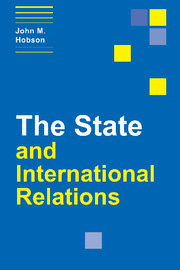Book contents
- Frontmatter
- Contents
- List of figures
- Acknowledgements
- 1 What's at stake in the ‘second state debate’? Concepts and issues
- Part 1 Traditional theories of the state and international relations
- Part 2 Recent sociological theories of the state and international relations
- Part 3 Conclusion: proposing a ‘structurationist’ theory of the ‘constitutive’ state and global politics
- References
- Index
1 - What's at stake in the ‘second state debate’? Concepts and issues
Published online by Cambridge University Press: 31 March 2010
- Frontmatter
- Contents
- List of figures
- Acknowledgements
- 1 What's at stake in the ‘second state debate’? Concepts and issues
- Part 1 Traditional theories of the state and international relations
- Part 2 Recent sociological theories of the state and international relations
- Part 3 Conclusion: proposing a ‘structurationist’ theory of the ‘constitutive’ state and global politics
- References
- Index
Summary
Introduction: the two ‘state debates’ within the social sciences
If ‘the state is dead’, as so many International Relations (IR) scholars today contend, why do we need a book on ‘the state and International Relations’? Indeed, it seems that the direction that the ‘vanguard’ of IR theory is currently taking is, if not in the opposite direction to the state, then at least ‘away from the state’. Surely one of the common denominators that underpins the rapid rise of postmodernism, of critical theory and especially of constructivism along with feminism and Marxism, is an agenda that goes beyond the state: one that indeed seeks to displace state-centrism in general, and ‘the state’ as an object of enquiry, once and for all? At least, this appears to be the received wisdom within IR. But the argument of this book takes the form of a paradox: that it is neorealist state-centrism that denies the importance of the state in IR, while the various approaches listed above (along with liberalism), I argue, all take the state more seriously – a position which I readily concede contradicts my earlier statement (Hobson 1997: 1). This surprising conclusion emerges from introducing and applying a conceptual innovation that has largely been ignored by IR scholars – the ‘international agential power’ of the state – and reappraising each theory through this particular lens. This enables us to radically (re)view state theory in IR, such that in effect we end up by turning IR theory upside down.
- Type
- Chapter
- Information
- The State and International Relations , pp. 1 - 14Publisher: Cambridge University PressPrint publication year: 2000

